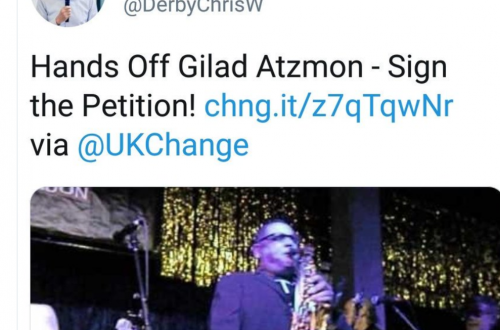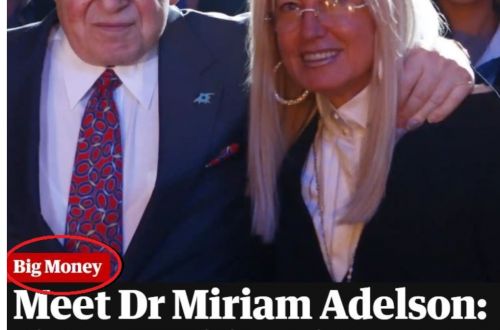This is a cross post by Mark Gardner from The CST Blog
(This is the 3rd in a series of sections and summaries from CST’s recently released report, Antisemitic Discourse in Britain in 2009. The full pdf can be accessed here. 58 pages, including graphics.)
Pages 13-16 of the Report explain aspects of Zionism and anti-Zionism relevant to antisemitism. (They can be accessed here.) As with the preceding section, What is Antisemitism? this section obviously summarises a far larger subject.
It begins with
British Jews: Relationship with Israel and Zionism
The multiple dynamics between antisemitism, anti-Israel activity and “anti-Zionism” are fundamental to the nature, content and impact of contemporary British antisemitism; and to the concerns of British Jews.
There is then a short mention of “repeated criticism and outright hostility” directed against Israel by “relatively large sections of the liberal-left”. The report continues
British Jews hold varying perspectives on the legitimacy and motivation of this behaviour: ranging from those who play a leading part in the anti-Israel activity, to those who regard anti-Israel actions as antisemitic per se.
…CST (and other UK Jewish bodies) do not believe that it is necessarily antisemitic to criticise Jews, Israel or Zionism, even if that criticism is harsh or unfair. Antisemitism is, however, a form of racist and political activism. Because of its nature, antisemitism thrives upon criticism of Jews, Israel and Zionism, regardless of how fair or unfair that criticism happens to be.
Criticism of Israel or Zionism is not antisemitic per se, but it risks becoming so when traditional antisemitic themes are employed or echoed. This commonly occurs when the word “Zionist” or “Israeli” is employed where “Jew” would have previously appeared.
Calls for the actual destruction of Israel or “Zionism” transcend both criticism and hostility. Such incitement may not be regarded as antisemitic by its proponents; but if they were to succeed, it would be profoundly harmful to the morale and self-identity of many British Jews.”
The following three pages begin with
Anti-Zionism: A Unifying Language for Different Political Extremists
The corruption and debasement of the word “Zionism” in both extremist and mainstream circles is central to contemporary antisemitic discourse.
…To many self-described “anti-Zionists”, the word “Zionist” now resonates as a political, financial, military and media conspiracy that is centred in Washington and Jerusalem, and which opposes authentic local interests. Many “anti-Zionists” believe themselves to be sincerely opposed to antisemitism, but extreme definitions of “Zionism” echo previous antisemitic beliefs about ‘the Jews’.
Worse still, the prejudices of conscious antisemites are reinforced by the ever-evolving anti-Zionist lexicon…This discourse encourages antisemites, many of whom take expressions such as “pro-Israel” or “well-financed” to be coded public expressions for their own publicly restricted opinions.”
Three sub-sections then follow, on anti-racism and the antisemitic continuities and impacts of anti-Zionism. These include the following
Lessons from anti-racism
Israel’s critics should limit the antisemitic content and impact of their behaviour by utilising basic principles of anti-racism…avoid inflammatory catch-all terms such as “Israel’s supporters” and “Zionists” – both of which can be easily understood to mean most Jews, but are frequently used in a demonising and dehumanising manner…avoid replicating older antisemitic narratives and themes in modern guise. Furthermore, anti-Israel actions such as boycotts should at least be acknowledged by their proponents as activities that will genuinely concern and isolate many Jews.
…Continuities between antisemitism and anti-Zionism
There are numerous continuities between historical antisemitic themes and modern anti-Zionism. These include
- Alleging that Jewish holy books preach Jewish supremacy and that this is the basis for alleged Zionist racism.
- The image of the shadowy, powerful “Zionist” repeats the antisemitic charge that Jews are only loyal to each other…secretly conspire to control media, economy and government for their nefarious ends.
- Historically, Jewish converts to…Christianity, nationalism or communism had to show that they had cast off their ‘Jewishness’. Today, some people…expect Jews to declare their attitude to Israel before they will treat them decently…
- Dehumanising antisemitic language comparing Jews to rats, cancer, plague and bacteria is now repeated in some depictions of Israel and Zionists…encouraging the notion that ‘cleansing’ or ‘extermination’ must occur.
- Scapegoating Jews…for local and global problems; and demanding their destruction or conversion as a vital step in the building of a new, better world is echoed in the notion that Zionism is uniquely illegitimate; and that the destruction of Israel is paradigmatic of theological and political struggles for the future of the world.
- The image of Jews as alien corrupters of traditional, authentic society…[and] values survives in contemporary portrayals of pro-Israel lobbyists…persists in some mainstream UK media depictions of American pro-Israel lobbyists.
Antisemitic impacts of anti-Zionism
Anti-Israel and anti-Zionist discourse, especially from the liberal-left, media, charities and trade unions may not in any way be inspired by antisemitism. Indeed, these activists may specifically warn against the danger of antisemitic outcomes…they understand that hostile discourse about Israel and Zionism can – however inadvertently – have antisemitic impacts. Nevertheless, otherwise sincere anti-racists sometimes adopt, echo or condone antisemitic positions that are ostensibly fostered by their hostility to Israel and Zionism…
[Antisemitic impacts of anti-Israel and anti-Zionist discourse are then listed as] including:
- British Jews…fall victim to antisemitic race hate attacks over international events that are blamed upon Israel and/or Zionsts…
- Providing concealment, encouragement and self-legitimisation for antisemites
- Depicting the Jewish state as a uniquely racist or imperialist enterprise serves to threaten, isolate, and demonise all those who believe that Jews have a right to statehood…
- The fostering of a reflexive hatred, fear, suspicion or bias against Jews…prejudicially treated due to their supposed support for Israel or Zionism.
- Extreme hostility to mainstream Jewish representative bodies that actively support Israel.
- The use of “Zionist” as a pejorative description…such as the “Zionist Jewish Chronicle” or the “Zionist CST”…then maltreated for being allegedly Zionist, rather than properly engaged with…
- Contemporary antisemitism is judged by its utility to Zionism and is reacted to on that basis…widespread contempt for mainstream Jewish concerns…No other minority’s concerns about hate crime are treated so harshly…Similarly, Holocaust commemoration is sometimes judged by its utility to Zionism…
- Employing anti-Israel rhetoric or actions specifically because they have unique resonance for Jews…[eg] comparing Israel to Nazi Germany…academic boycott of Israel on the basis that education is a particularly Jewish trait.
- Enacting anti-Israel activities, especially boycotts, that inevitably impact against local Jews far more than any other sector of society.
(Next in this series of articles: Gaza Conflict and UK Antisemitic Discourse)


